Dr Chris Steele MBE, well known media doctor for ITVs This Morning programme and recently diagnosed with coeliac disease agreed to be interviewed by What Allergy about his views on coeliac disease, getting a diagnosis and how to maintain a healthy diet when you’re avoiding gluten. He has been involved as a Health Ambassador for Coeliac UK for at least five years, all good experience for the medical diagnosis he was later to recieve.
Firstly a brief explanation of what Coeliac Disease is and then onto the fun stuff, my interview with Dr Chris who had me in stitches. He is so down to earth, matter of fact and easy to chat to. This is his story of his own coeliac diagnosis and also some advice about eating healthily and oats in a gluten free diet.
Just look at that smiling face.
You could feel the smile even down the telephone wires.
Special thanks to Dr Chris for agreeing to speak with me, it was a lot of fun, I learnt loads about coeliac disease and am now craving Nairns Oat and Syrup biscuits…
So what is coeliac disease?
The brief description here is from the Coeliac UK website who can describe this condition far better than me.
Coeliac disease (pronounced see-liac and spelled celiac in other countries) is a lifelong autoimmune disease. It is caused by the immune system reacting to gluten.
It is actually pretty common and affects 1 in 100 people. However only 10-15% who have the condition have been diagnosed which means there are currently half a million people who have the condition but don’t yet know. If a first degree family member has the condition then the chances of having the condition increase to 1 in 10.
It’s caused by a reaction of the immune system to gluten – a protein found in wheat, barley and rye. When someone with coeliac disease eats gluten, their immune system reacts by damaging the lining of the small intestine.
Symptoms range from mild to severe, and can include bloating, diarrhoea, nausea, wind, constipation, tiredness, headaches, mouth ulcers, sudden weight loss, hair loss, anaemia and osteoporosis.
And there is currently no cure. The only course of action is to avoid gluten.
An interview with Dr Chris Steele about coeliac disease and eating oats!
Q1. When were you diagnosed as a coeliac and how easy was it to get a diagnosis?
Q1. When were you diagnosed as a coeliac and how easy was it to get a diagnosis?
Well I finally found out my problems were caused by coeliac disease about three years ago and I have to admit it was a complete surprise. Despite being involved with Coeliac UK I didn’t know an awful lot about it and I certainly never thought I had it. There is a certain irony of the doctor supporting a charity suddenly discovering he has the very same condition. I had been ignoring many of the symptoms and putting down various bouts of ‘the runs’ down to a dodgy curry or a bit of food poisoning. But after one very nasty experience at a friend’s wedding where I actually had an accident in my pants, which was awful, I finally did go to see a doctor about it
Yes you can mention that, many coeliacs will probably relate to it. Coeliac disease can affect your body in such a violent way, it’s horrible, and people shouldn’t ever feel embarrassed about going to see their doctor and being totally honest about what’s happening. I think maybe people are reluctant to share something like this with anyone but it’s a sign something is very wrong so go and get checked out. I went to a see a friend who was also a doctor and was initially diagnosed with irritable bowel syndrome (IBS) but my symptoms did not get better, if anything they got markedly worse and I had significant abdominal discomfort. He eventually suggested, ‘we had better check for coeliac disease’, to which I replied, ‘NO WAY – I haven’t got that’. But I did have it! The blood test came back positive. I had been hoping it wasn’t anything like bowel cancer which is everyone’s worse fear so once that was ruled out it was a relief to know what was causing all my problems. And also to know that I knew the charity who could help me out very well!
Q2. What advice would you give anyone who is seeking a diagnosis and suspects they have coeliac disease?
Doctors often don’t explain how these tests work. If you have the blood test done but have been avoiding all gluten the chances are it will come back negative. You need to be eating wheat/gluten for at least three weeks leading up to the test for the results to be of any use. This is obviously very difficult to do if your symptoms, like mine, are particularly nasty.
The next step is a biopsy but this means eating gluten for about six weeks. Not something any coeliac would relish doing. And many people never get a proper diagnosis because they can’t face doing this.There is also a condition called non-coeliac gluten intolerance which is harder to diagnosis but no less painful. For these people tests come back negative but they have a very real condition that makes them very ill if they consume any gluten.
Q3. Why is it so hard to get a diagnosis?
We (GPs) do miss a lot of coeliacs because it is so hard to diagnose and IBS is the first thing most doctors suggest. And there is no test for IBS so it shouldn’t be the first thought. It should be the last thought when all other possible conditions have been ruled out.
My own diagnosis took three years and I’m a doctor and should have known to ask for that test.If you have been diagnosed with IBS and your health is not controlled and gluten causes you problems like diarrhoea, bloating, stomach pain etc. consider the idea that you have coeliac disease until proven otherwise. If we all thought like that we would see far more diagnosed coeliacs.
It’s wrong that it can take up to 7 years to get a diagnosis but hopefully awareness is improving and in the future tests may be easier to do and not involve the biopsy route. The problem is not having enough time with patients. Typically a consultation lasts 10 minutes which is not long enough really. When a doctor is seeing 50 people a day it’s hard to give the attention each patient deserves.Q4. What are you Top 4 tips for anyone who has been diagnosed coeliac?
The only thing they can do really is cut out all gluten which is very difficult to do. So many foods from bread, cakes, biscuits and pastries to sauces, curries and even chips if they’re coated can contain hidden gluten.
I would suggest everyone who is diagnosed should join Coeliac UK, Read ALL labels on anything you buy and become an expert on what contains gluten
Learn as much as you can from your doctor, support groups and forums
Keep a food diary and record any times when you think you’ve eaten gluten mistakenly. It can be hard at first for people to get to grips with a truly gluten free diet so keeping a diary can help you learn from any mistakes and work out what caused them.
Q5. It can be a genetic condition, do any of your family have coeliac disease?
So far no, they haven’t. I have three kids who are all grown up now so far only one of them has actually been tested. He is the most health conscious of the three as he is also an Olympic athlete so is used to watching what he eats anyway. I’ve told them they should but we’ll see. They are eating gluten at the moment and not reporting any problems.
Q6. With your career as a Media doctor, how do you cope eating on the go?
I tend to get an early train and eat before I go if I can. I always take oat cakes or fruit to snack on and if I have forgotten to bring anything there is usually an M&S where I can find something tasty and healthy to eat that doesn’t have gluten in it. I definitely stay away from any of the gluten snacks available when I’m working on the TV.
Having spent 45 years in general practice I now find the media work far more rewarding. I can educate huge numbers of people about various health issues rather then the few you get to help at the doctor’s practise. I left general practise a few years ago and don’t miss it now.Q7. Do you eat many processed gluten free products?
I don’t as a rule. Some can be very highly processed and lack fibre, are higher in salt, fat and sugar. I know there are some good products out there, like Nairns oat cakes, which are pretty natural and healthy but I don’t tend to eat many gluten free supermarket products.
Q8. You mentioned that oats are an important cereal in a coeliac’s diet – why are they so important?Oats are such a healthy grain and whilst some may be contaminated with wheat traces there are gluten free oats out there. I would recommend coeliacs do try oats in their diet. Some people do react even to oats but most coeliacs can tolerate oats.
If you don’t try oats you’re missing out. They are very, very important. They are a tremendous source of different types of fibre. They stimulate bowel action and everyone needs enough fibre in their diet for health digestion. Oats are also a source of soluble fibre which controls the release of sugar into the blood stream and increases absorption in the small intestine. They make you feel fuller for longer and also provide a slower release so you have more energy as well as helping to reduce cholesterol.Q9. What food do you miss most now you’re a coeliac?
Lots of things. Where do I start?
One of the things I used to love was hobnob biscuits. I craved them and at The Allergy Show this year I visited the Nairns stand and they gave me a Nairns Oats & Syrup biscuit to try. Well, I would never have thought that an oat cake could taste so good.
They are my new favourite biscuit – just as tasty as hobnobs.
I could also murder a good sandwich. I do buy gluten free bread and keep some in the freezer but so far I haven’t yet found one that quite lives up the memories of a really good sandwich.
Q10. What’s your favourite cake?
I am quite sweet toothed and my favourite is probably good home made carrot cake with a good thick icing. Home made cake is glorious. I also miss a good crumble.
[Ed/WhatAllergy: You can make a very good gluten free carrot cake and a crumble topping using oats ]
Q11. What do you do when you’re relaxing and not being a TV media doctor?
I have two grand children who I love spending time with. I have also moved house recently and enjoy spending time in my garden, as well as keeping fit and exercising. I stopped drinking alcohol a few years ago due to high blood pressure and haven’t touched a drop since and I feel much better for it. I’m always on the go!
Special thanks to Dr Chris. I told him I would look out for him the tele and he replied, “I’ll give you a wave!”
I’ll be watching Dr Chris, for your wave.
So, anyone have a question for Dr Chris? What would you have asked him? If you are a coeliac how long did it take you to get a diagnosis? and how are you coping now avoiding gluten? How often do you get glutened?









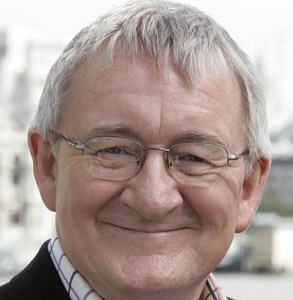
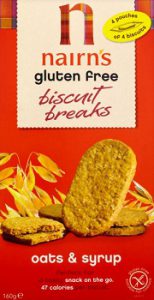
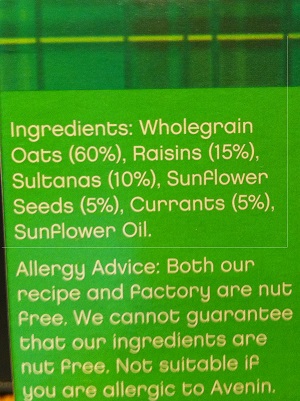
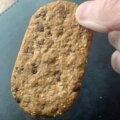
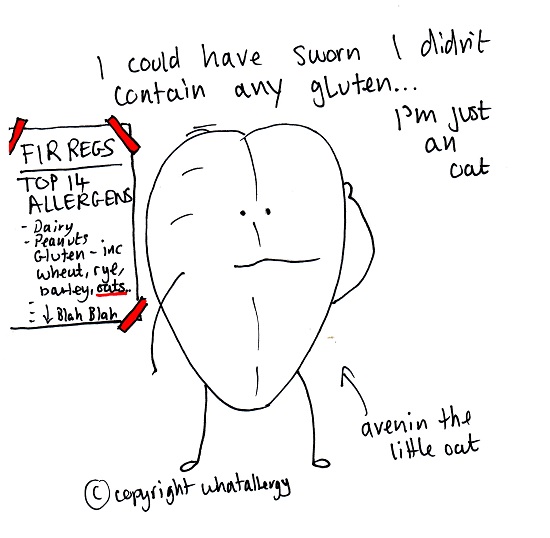
I Found this really interesting. I’ve forwarded it to a few people I know that have coeliac members of their families. Just shows how diagnosis can be difficult and take time,for even those that know the system.
Also its good to be able to have a positive figure in the public eye to be able to identify with and help raise positive awareness.
Whilst it may not be instantly life threatening,its extremely life limiting when not understood or under control.
Yay! to Dr Chris and Ruth for a great article.
Hi Alison, Thank you! Yes it does show how hard a diagnosis is when even a doctor involved with Coeliac UK doesn’t suspect Coeliac Disease until all other options have been ruled out. And he is a very positive figure. Such a lovely man, very down to earth and just wants to help others get a diagnosis and spread awareness about what #CD is all about.
Hi,
I noticed a £20 test and it advertised your name. Is this genuine?
Regards
Chris
Re my previouse post the £20 test is on https://www.healthcheckshop.co.uk/store/coeliac-disease-test?gclid=CKLdxfqWn8sCFasV0wodyLUKBARe